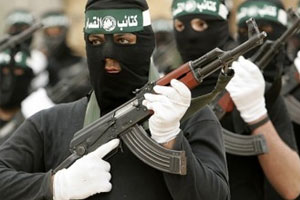 New Delhi:
New Delhi: “I’m an engineer, but I want to be a ‘Jihadi’ first.”
This could be the next service-on-offer from a section of Indian Muslim youth, if one goes by the National Investigation Agency’s (NIA) dossier allegedly mentioning that more than 300 Indian youth have been recruited by Pakistan-based Tehreek-e-Taliban. What is alarming is the fact that the Tehreek-e-Taliban has joined hands with the ISIS (Islamic State of Iraq and Syria), now also calling itself simply the Islamic State or IS after declaring the setting up of a 'caliphate'.
Referring to the dossier, a TV news channel recently reported that youth are being recruited from Kerala, Tamil Nadu, Maharashtra and Karnataka, and are being trained in Pakistan, Iraq and Syria to be ‘fidayeen’. It is yet to be ascertained whether the 300-plus youth supposed to have undergone training are all from India. Besides, the figure itself is yet to be confirmed. However, the phenomenon of Indian Muslims joining the ISIS as ‘jehadis’ is indeed alarming, especially since the case of Mumbai-based engineering student Arif Ejaz Majeed came to light. Majeed has reportedly been killed fighting alongside Islamist insurgents in Iraq.
The death of 23-year-old Majeed and the online tributes paid to him by the Islamic militant outfit Ansar-ul-Tawhid hailing his ‘martyrdom’ confirms that a section of Indian Muslim youth are ready to lay their lives “in search of paradise”. Moreover, the website of Ansar-ul-Tawhid has reportedly given a call to Indian Muslims to join the ‘jihad’, proving that India is gradually gaining importance as a fertile ground for terror recruiters along with Pakistan and Bangladesh.
“Whether more than 300 youth were recruited on Indian soil for ISIS or its allied outfits is yet to be confirmed, but it can be said with certainty that Islamic terror outfits have gradually made inroads in the non-Hindi states, especially southern and western states, for recruiting young Muslims to fight in Afghanistan, Syria etc. in the name of Jihad,” an intelligence agency source said.
Majeed’s case has punctured the commonly held belief that it’s only the impoverished, illiterate, socially marginalized Muslim youth who join terror outfits or become easy prey to their recruiters. “Majeed’s case has shattered this myth. Now, even educated, upwardly mobile, urbane Muslim youth are joining terror outfits in the name of jihad. It’s only after Majeed’s death that we’ve become aware of the imminent danger,” said Alok Bansal, director, Centre for Security and Strategy, India Foundation.
According to intelligence agencies, the potential for recruitment all over the subcontinent is big, although it is more applicable to Pakistan and Bangladesh than India. Yet, the possibility of recruitment from India cannot be denied. All these may not come from within India itself; many could be those who form part of the worker class diaspora in West Asia, particularly the Gulf region where they come in contact with Muslims from other nations and get slowly radicalized.
“Social media is playing a very negative role and will continue to influence young people. So, in the long term the feasibility of more recruitment is very much alive. Moreover, many Indian workers, who share camps with Pakistani and Bangladeshi workers, come in contact with potential terror recruiters, who get them in their fold,” said Lt Gen (Retd) SA Hasnain, strategic analyst and former military secretary.
“The recruitment is not limited to India alone. Thousands of Indians have gone to Middle East, the UAE, Lebanon, Kuwait and Iraq as workers and labourers, and some of them even participated in wars for some time. Out of these, some either have joined ISIS or act as recruiters after getting back to India,” said Bansal, adding, “Indian officials have no track of these people, which is dangerous."
But, what motivates a section of the educated Indian Muslim youth like engineers, IT professionals etc to join jihadist movements abroad? “It’s psychological empowerment that motivates them to join. They feel artificially powerful as by joining these militant groups they intimidate people, unleash terror on innocents and women, and establish some kind of psychological hold through a pseudo-macho image,” said Hasnain. He added that besides modern education, parallel teaching by clergies leaves the grain of radical ideology in the sub-conscience of many Muslim youngsters.
The ISIS, also referred as ISIL (Islamic State of Iraq and the Levant)—a Sunni jihadist group-- is a breakaway faction of al-Qaeda and aims to build an Islamic state spread across Iraq and Syria and a few other Middle Eastern countries, for the Sunni Muslims; it has now transformed itself into Islamic State (IS). Its Shura has ‘elected’ the elusive Dr Abu Bakr al-Baghdadi, the jihadist leader, as the new Caliph. This proclamation of Baghdadi as Caliph Ibrahim – the caliph of all Muslims -- has made him even more powerful than al-Qaeda leader Ayman al-Zawahiri.
"The main characteristic of ISIS is its ruthlessness, and this is attracting many youths from across the world, including Indians,” an intelligence source said. What factor helps extremist groups in indoctrinating modern youth to leave their own country and fight on a foreign land, has been an enigma for the intelligence agencies in India and abroad.
"These radical groups are able to indoctrinate modern youth, by getting theocratic validation using selective religious texts, and thereby inspiring Sunni youth across the globe to fight the holy war,” added Bansal. Experts opine that the government should go for a calibrated de-radicalisation on top priority, so as to save many more young Majeeds from joining the ISIS and getting killed, without the knowledge of their families back home.
 New Delhi: “I’m an engineer, but I want to be a ‘Jihadi’ first.”
New Delhi: “I’m an engineer, but I want to be a ‘Jihadi’ first.”